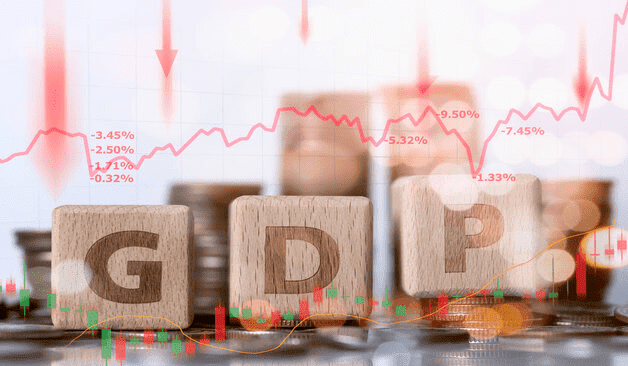
What is GDP & What does it Say About our Economy?
We keep reading about the growth or decline in Gross Domestic Product (GDP) numbers from rating agencies and the central bank, the Reserve Bank of India. It is considered one of the most useful economic indicators for the Indian economy (and other countries).
Given the importance GDP data gets in different economic forums, it becomes crucial for investors (and every individual) to understand GDP. Understanding macroeconomics and microeconomics is essential for each individual to make better financial decisions. Let us comprehend the term in detail and what it tells about the state of the economy.
What is GDP?
GDP represents the total monetary value of all final goods and services produced (and sold) within a country during a specific period. It is a measure of economic activity in the country.
The 'Gross' in GDP indicates that products are counted regardless of their use - the product can be used for investment, consumption, or to replace an asset. The word 'Domestic' tells that goods and services counted are those produced within the country, while 'Product' stands for production, or economic output, of final goods and services sold on the market.
Before we move on to learning GDP in detail, let us understand a few more common words around GDP.
- GDP Growth Rate: It measures the percentage change in real GDP (GDP adjusted for inflation) over a period, - quarter-on-quarter or on-year. If it is negative, it represents economic contraction and vice versa.
- GDP Per Capita: GDP per capita is calculated by dividing nominal GDP (without factoring in inflation) by the country's population. It gives the average economic output per person in the country.
How is GDP calculated?
There are three ways to calculate the GDP. In theory, no matter which option the country chooses, the end result should be the same.
- Expenditure method: It calculates GDP according to how much money was spent.
- Factor cost method: It measures GDP by calculating the value addition generated by each sector of the economy as it moves through the supply chain.
- Income method: It measures the value of the income generated in terms of wages and profits.
In India, GDP data is calculated using the expenditure and factor cost method across eight industries. They are used to analyze how different areas of the economy are performing.
What GDP tells you & why is it important to you?
GDP helps the government, investors, and businesses decide by understanding an economy's health - GDP indicates the economy's health.
When the GDP is growing, businesses and workers are better off than when it is contracting. In the growing GDP, you will see more jobs, rising wages, and higher profits for companies. You can conclude that your job is secured. Also, you can expect salary hikes and even better returns on your investments.
When the GDP is shrinking, employment often declines. The same is evident from the US GDP numbers and the employment rate in 2022. If the GDP declines over two consecutive quarters, by definition, the economy is in recession. If that happens, you can expect pay freezes and job cuts.
GDP helps the government decide how much it needs to raise in taxes and how much it needs to spend on public services. When the GDP is growing, one can conclude that the government is doing a good job. It works in a cycle - when GDP numbers increase, people earn more and pay more taxes. It means the government gets more money to spend on public services, which boosts the economy even further. The cycle is broken by events such as pandemics, wars, etc.
Therefore, GDP numbers are crucial for businesses, the government, and every citizen of the country. As an investor, you can plan your investments based on the GDP data and projections. For example, if it is evident that the economy will move to a recession, you may not want to invest in the equity market for a short duration.
GDP Limitation
You can understand any term completely when you understand its limitations as well. Without a doubt, GDP is a useful indicator for determining a country's economic performance and individual well-being. However, there are certain limitations to using GDP. Some of them are listed below:
- Non-market transactions are not part of it.
- It fails to account for the degree of income inequality in society.
- The failure to indicate whether the country's growth rate is sustainable or not.
- Treating the replacement of depreciated capital the same as new capital creation.
Because of the above limitations, economists are now proposing other indicators such as the Human Development Index (HDI), Genuine Progress Indicator (GPI), and Happy Planet Index (HPI).
Conclusion
We hope the above information provided you with useful insights into the GDP. The essential takeaway is that, whether you are an investor or a common citizen, understanding GDP is beneficial and needed for your professional development.
Disclaimer: ICICI Securities Ltd. (I-Sec). Registered office of I-Sec is at ICICI Securities Ltd. - ICICI Venture House, Appasaheb Marathe Marg, Prabhadevi, Mumbai - 400 025, India, Tel No : 022 - 6807 7100. The contents herein above shall not be considered as an invitation or persuasion to trade or invest. I-Sec and affiliates accept no liabilities for any loss or damage of any kind arising out of any actions taken in reliance thereon. The contents herein above are solely for informational purpose and may not be used or considered as an offer document or solicitation of offer to buy or sell or subscribe for securities or other financial instruments or any other product. Investments in securities market are subject to market risks, read all the related documents carefully before investing. Investors should consult their tax and financial advisers whether the product is suitable for them before taking any decision. The contents herein mentioned are solely for informational and educational purpose.










